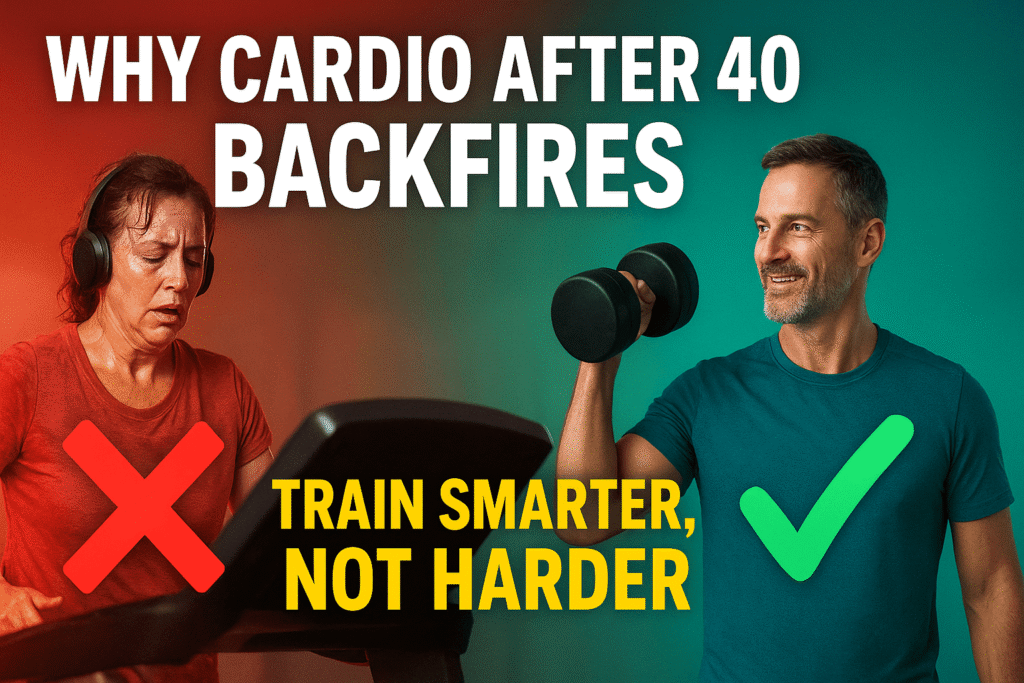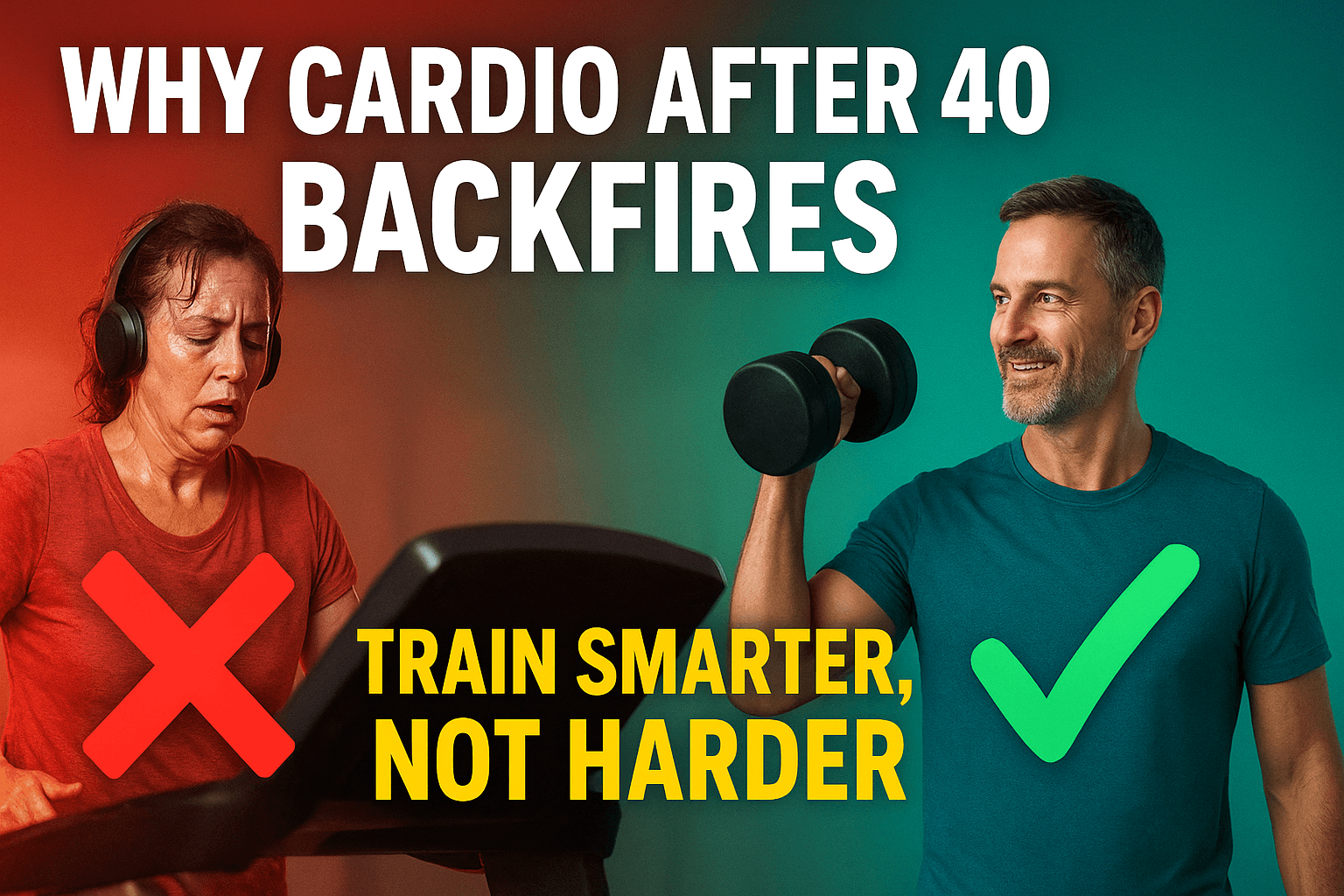Many over 40 turn to cardio for fat loss, but it often backfires. Discover why hormone shifts change results and how to train smarter with strength, protein, sleep, and recovery. Most people over 40 turn to cardio when they want to lose weight.
“They add more runs, more spin classes, and generally just more hard work at the gym. But the results rarely match the effort. The harder they push, the softer they feel.”
The issue isn’t willpower. “The problem is that you’re fighting against your changing physiology.”
After 40, hormone levels shift. “Testosterone and growth hormone decline. Cortisol rises more easily. Recovery slows. That changes how your body responds to exercise.”
And the consequence? “When you try to use cardio to burn stubborn fat, you don’t burn it off. You burn muscle, disrupt recovery, increase cortisol (which is likely already high), and push your body further into storage mode.”
The solution, according to the plan, isn’t to work harder. “The solution to stubborn fat isn’t to push harder. It’s to train smarter with a plan that respects your biology at this stage of life.”
Cut the Excess Cardio
“Long, hard sessions drive cortisol up and testosterone down. Keep ‘cardio’, but change the dose and intent.”
The approach is simple:
- “Walk daily: 8–10k steps”
- “Use Zone 2 as a tool (30–45 min, easy pace), not a way to burn calories”
- “Add one short interval session only if you’re recovering well”
Result: “better conditioning without impacting your hormone health.”

Lift Heavy, Three Days a Week
“Muscle is your best fat-loss lever and your metabolic insurance.”
The plan recommends:
- “Full-body sessions”
- “Squat / hinge / press / pull / carry”
- “<45 minutes, leave 1–2 reps in the tank with each set”
- “Progress slowly and consistently”
Result: “more calories burned at rest, better insulin sensitivity, stronger joints.”
Also Read: Economic Collapse Signs: Jobs, Inflation, and Housing Crisis
Eat More Protein
“Most people 40+ undereat protein and overeat refined carbs.”
The recommendation:
- “30–40 g of protein per meal”
- “Morning: eggs + beef”
- “Later meals: chicken, salmon, or steak”
- “Add a clean shake if needed”
Result: “easier muscle gain, steadier appetite, better recovery.”
Stop Crash Dieting
“Dieting can impact sleep, hormones, and training quality.”
Instead:
- “Fuel to train and recover”
- “Center meals on protein + produce, add smart carbs around training”
- “Aim for a moderate deficit if fat loss is the goal”
Result: “fat loss without slowing the metabolism.”
Fix Sleep First
“One poor night reduces insulin sensitivity and increases hunger the next day.”
Recommendations include:
- “In bed by 10:30 p.m.”
- “Cool, dark room”
- “No screens in the last 60–90 minutes”
- “Consider magnesium glycinate, glycine, or inositol if needed”
Result: “stronger hormones, better training, fewer cravings.”
Get Morning Light
“Five to ten minutes outside, within 30 minutes of waking.”
This helps:
- “Lowers cortisol to baseline later in the day”
- “Anchors the circadian rhythm”
- “Supports mood and testosterone”
Result: “more alertness throughout the day, steadier focus, better sleep that night.”
Reduce Estrogenic Stressors
“Your environment can work against you.”
Recommendations include:
- “Swap plastic → glass/stainless”
- “Cook with tallow, ghee, olive oil, coconut (no seed oils)”
- “Choose red meat, eggs, and fish over soy-heavy options”
- “Keep alcohol to 1x/week max”
Result: “your hormones can work as they’re supposed to.”
Train Insulin Sensitivity
“Insulin resistance is a subtle fat-loss killer.”
The plan advises:
- “Walk 10–20 minutes after meals”
- “Strength train consistently”
- “Limit snacking between meals”
- “Prioritize whole foods over ultra-processed”
Result: “better nutrient partitioning and easier fat loss.”
Update the Plan for Your Age
“What worked at 25 won’t help you at 45.”
The adjustments are clear: “shorter, smarter lifts; targeted cardio; real food; real sleep. Follow a plan that respects recovery and hormones.”
The Bottom Line
“If you’re grinding through cardio and counting calories but not changing, stop fighting your physiology.”
The advice is straightforward:
- “Walk more. Lift three days a week. Eat protein. Take sleep seriously. Keep cardio smart and recover with intention.”
Result: “You’ll drop fat, rebuild strength, and feel steady and clear again.




